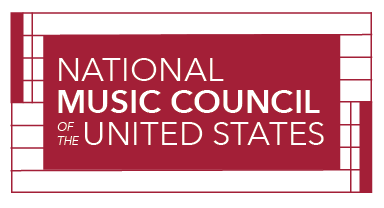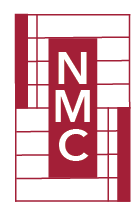On January 24th, the National Music Council of the United States honored singer-songwriter and music education advocate Rosanne Cash with the prestigious American Eagle Award “In Recognition of Her Indelible Contributions to American & Global Musical Culture as a Beloved Recording Artist, Performer, Composer, Educator, Activist, Altruist and Ambassador for American Music to the World.” The 41st annual American Eagle Awards were held in Anaheim, California at the 2025 NAMM Show.
One of the country’s pre-eminent singer-songwriters and music education advocates, Rosanne Cash has earned 4 Grammys and is also the author of four books including the best-selling memoir “Composed,” which the Chicago Tribune called “one of the best accounts of an American life you’ll likely ever read.” Among her many honors, Ms. Cash has been awarded the SAG/AFTRA Lifetime Achievement Award for Sound Recordings and the Smithsonian Ingenuity Award in the Performing Arts. She has also served as a Carnegie Hall Perspectives artist, was an Artist-In-Residence at the Country Music HOF and Museum, and is currently Artist-in-Residence at New York University. Rosanne is likewise one of only a handful of women to be elected to the Nashville Songwriters Hall of Fame, a number she hopes to see increase in the near future.
The ceremony was hosted by NMC President James Weaver, who also conducted an interview with the honoree on her life and work following the special award presentation. The award itself was presented by internationally renowned composer and recording artist Jackson Browne.
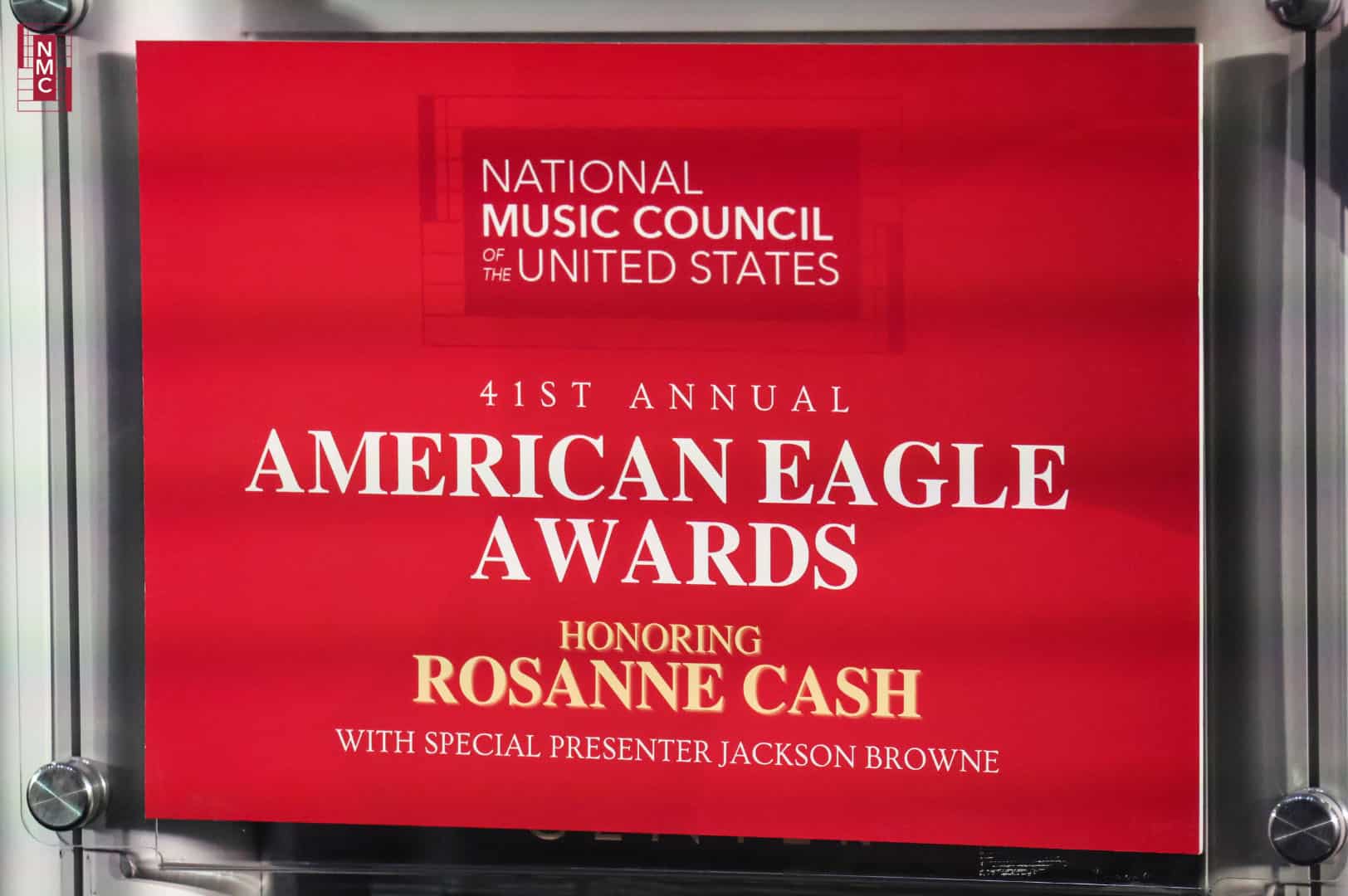
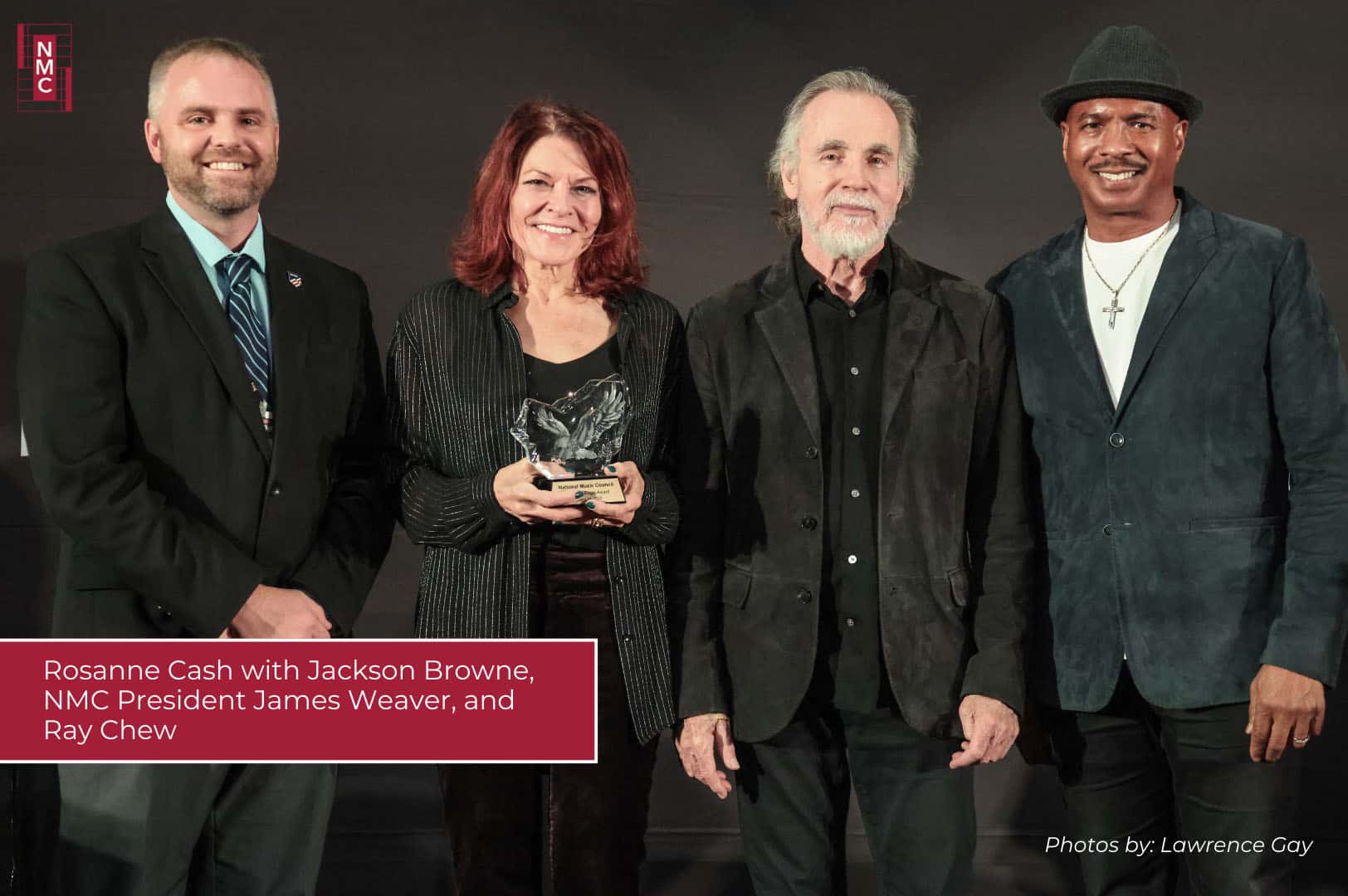
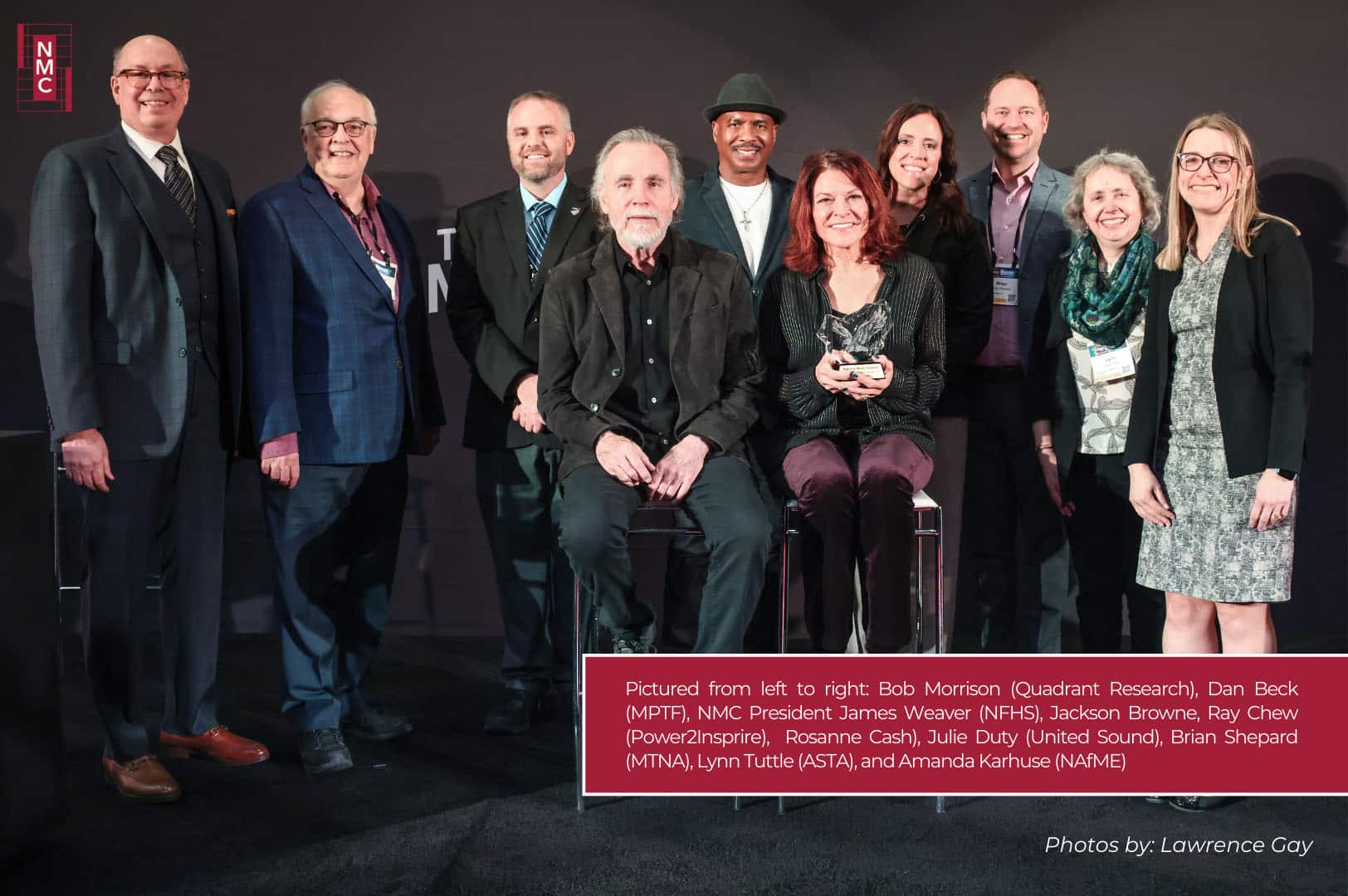

Renowned for his extraordinary talent as a songwriter and performer, Peter was equally celebrated for his boundless energy as a social activist, standing alongside luminaries like Dr. Martin Luther King Jr., Pete Seeger, and Harry Chapin. Whether performing with Mary Travers and Noel Paul Stookey or lending his voice to vital causes, Peter brought warmth, enthusiasm, and an unwavering willingness to help wherever it was needed.
We extend our heartfelt condolences to his family, friends, and the countless lives he touched. May his legacy—and the enduring magic of Puff the Magic Dragon—continue to inspire and bring joy to future generations.
July 8, 2024, NEW YORK CITY–The National Music Council of the United States (NMC) has issued an educational, legislative-based statement outlining the general consensus views of the American music creators, copyright owners and educators that constitute its broad membership, concerning both the opportunities and the existential dangers posed by the rapid introduction of generative artificial intelligence (GenAI) systems throughout the U.S. and global music communities.
With billions of dollars and the future of American musical culture at stake, NMC states that it is seeking to provide the basis through the attached statement for a more informed and far-reaching dialogue among creators, copyright owners, business leaders, technologists, legislators, students, educators and members of the public regarding the need for measured legislative action and governmental oversight to ensure fairness and equity in the GenAI marketplace.
According to NMC Chair Charles J. Sanders, “GenAI has the capacity – using pre-existing copyrighted works to produce new derivatives – to enhance human musical expression and public enjoyment of the musical arts through fairness in voluntary licensing, or to cause long standing, crushing and potentially irreparable damage to musical creativity, commerce and culture. Our goal is to support the best possible legislative outcomes for our organizational members and their constituencies, leading to ever-increasing advancement of human-centric musical excellence, progress, equity and cultural preservation around the world.” NMC President Dr. James Weaver adds “the issues covered in the document include the general principles of consent, credit, fair compensation, disclosure, record keeping, and a necessarily narrow application of any exceptions to infringement, limited to only certain, non-commercial exemptions in the area of education.”
Dr. David Sanders, NMC’s Executive Director, expressed his hope that the statement will help facilitate rapid, legislative progress toward protecting the rights of creators, copyright administrators and educators through cooperative discussion. “Our paper is intended as an educational primer designed to demonstrate both support of our membership for AI technology in general, but insistence in the context of GenAI on respect for the legal rights of the creative community – and for the principles of diversity, equity and inclusiveness which our community considers very high priorities.”
NMC is the Congressionally-chartered, educational umbrella organization for the broad spectrum of US music community advocacy groups. Founded in 1940, NMC’s membership is today comprised of almost fifty leading American trade organizations representing four distinct categories of music community interests: those of music creators; musical artists & performers; music copyright owners & administrators; and, music educators. In all cases and on every issue, each member organization explicitly retains the authority to speak independently on its own behalf, regardless of whether the views it expresses differ from those of NMC and/or other NMC members. Click here to read the GEN AI statement. For more information on NMC, please visit musiccouncil.org.
On June 14th, the National Music Council of the United States honored composer, multi-instrumentalist, and music ambassador David Amram with the prestigious American Eagle Award at the organization’s 40th annual ceremony in New York City at the Music Publishers Association annual meeting and awards luncheon.
A genuine polymath, David Amram is regarded as an expert in more musical genres than any other artist in the world, perhaps in history. He plays more than 35 instruments, has composed more than 100 well-received classical works, conducted 75 of the world’s great orchestras, and has been a soloist with more than 40 orchestras. Amram introduced the French Horn to jazz, was Jack Kerouac’s musical collaborator for twelve years, composed two operas, scored twenty-five films, composed music for twenty-five Broadway shows, and has worked with artists as diverse as Leonard Bernstein, Bob Dylan, Lionel Hampton, Odetta, Woody Guthrie, Pete Seeger, and Eugene Ormandy.
The award to Amram was presented by Grammy, Emmy, and Peabody award-winning singer-songwriter Tom Chapin, “in recognition of his longstanding, unique, and global contributions to the creation, performance, and appreciation of the musical arts, and in celebration of his pioneering work as an American musical ambassador for peace and culture throughout the world.” Chapin charmed the crowd with a song he penned in tribute to Amram, a funny and touching tribute that the awardee adored.





The US Patent and Trademark Office announcement, will be holding a public listening session on AI and IP, including copyright, at Loyola Law School in LA, on March 27 (both in person and remotely). The session will include representation from the Copyright Office and feature panel discussions by experts in the field of patent, trademark, and copyright law that focus on:
- a comparison of copyright and patent law approaches to the type and level of human contribution needed to satisfy authorship and inventorship requirements;
- ongoing copyright litigation involving generative AI; and
- a discussion of laws and policy considerations surrounding name, image, and likeness (NIL) issues, including the intersection of NIL and generative AI.
For more information about PTO’s work with stakeholders on AI, see its AI and Emerging Technology Events page.
The National Music Council weighed in on the International Property Organization (WIPO) Intergovernmental Committee (“IGC”) discussions on traditional cultural expressions. Read the full comments here.
The Reimagining Inclusive Arts Education Act, introduced by David Scott (GA-13) seeks to increase access to arts education and arts therapies for students with disabilities. Recognizing the benefits of arts education for children with disabilities, this legislation would provide grants to further train educators and arts therapists working with those students. Specifically, this legislation would;
- Direct the Secretary of Education to establish the Inclusive Arts Education Grant Program
- Eligible Entities for Funding: Local Education Agencies (LEAs), State Education Agencies (SEAs), or a partnership between an LEA/SEA and an Institution of Higher Education or Non-Profit Organizations
- Priority: Schools receiving Title I funds are given priority in the grant application process.
- Eligible uses of grant funding:
- Promoting curricula, best practices, professional development for arts educators and creative arts therapists in elementary and secondary schools that would;
- Eligible Entities for Funding: Local Education Agencies (LEAs), State Education Agencies (SEAs), or a partnership between an LEA/SEA and an Institution of Higher Education or Non-Profit Organizations
-
-
-
- Increase access and improve inclusion of children with disabilities in arts education programs.
-
-
-
-
-
- Adapt classroom materials and lessons to accommodate children with disabilities.
-
-
- Provide a definition of “Creative Arts Therapy” that specifically enumerates music as an available medium and highlights the social and emotional benefits of the arts.
On January 10, 2024, Reps. María Elvira Salazar (R-FL) and Madeleine Dean (D-PA) introduced the No Artificial Intelligence Fake Replicas And Unauthorized Duplications (No AI FRAUD) Act. The bill establishes a federal framework to protect Americans’ individual right to their likeness and voice against AI-generated fakes and forgeries.
The No AI FRAUD Act establishes a federal solution with baseline protections for all Americans by:
- Reaffirming that everyone’s likeness and voice is protected, giving individuals the right to control the use of their identifying characteristics;
- Empowering individuals to enforce this right against those who facilitate, create, and spread AI frauds without their permission; and
- Balancing the rights against First Amendment protections to safeguard speech and innovation.
Nearly 300 artists, songwriters, actors and other creators have voiced their support of the No AI FRAUD Act.
To send an email to your officials voicing your support, visit the Human Artistry Campaign’s “Contact Congress Portal.”
